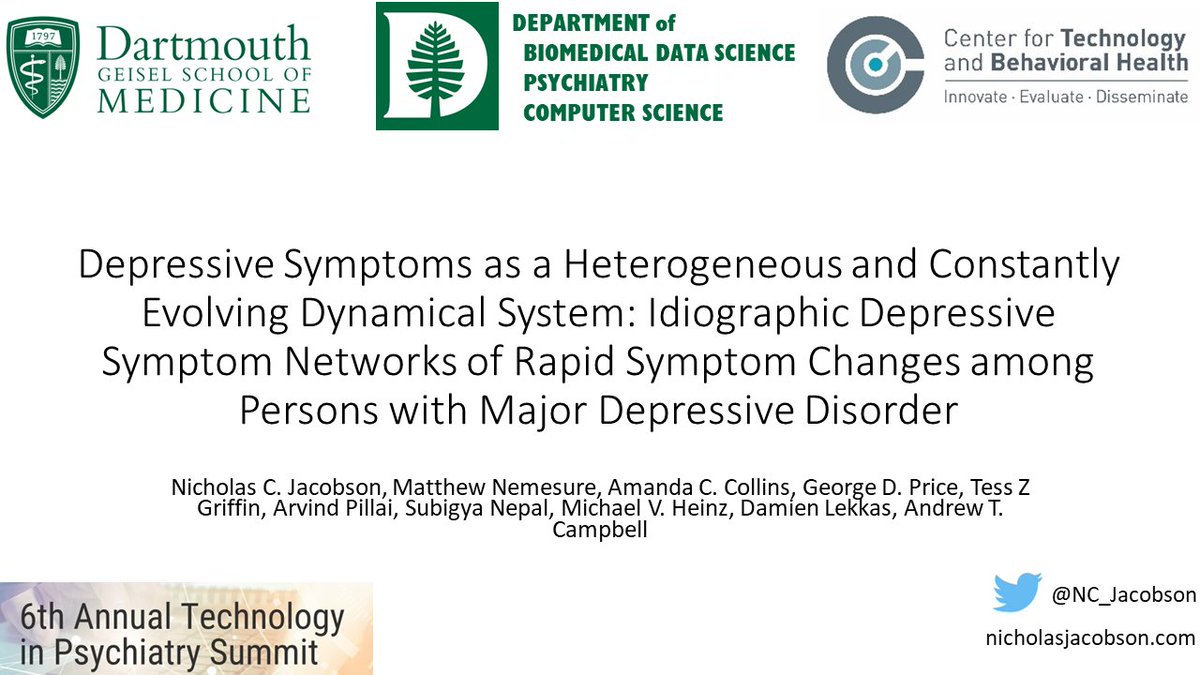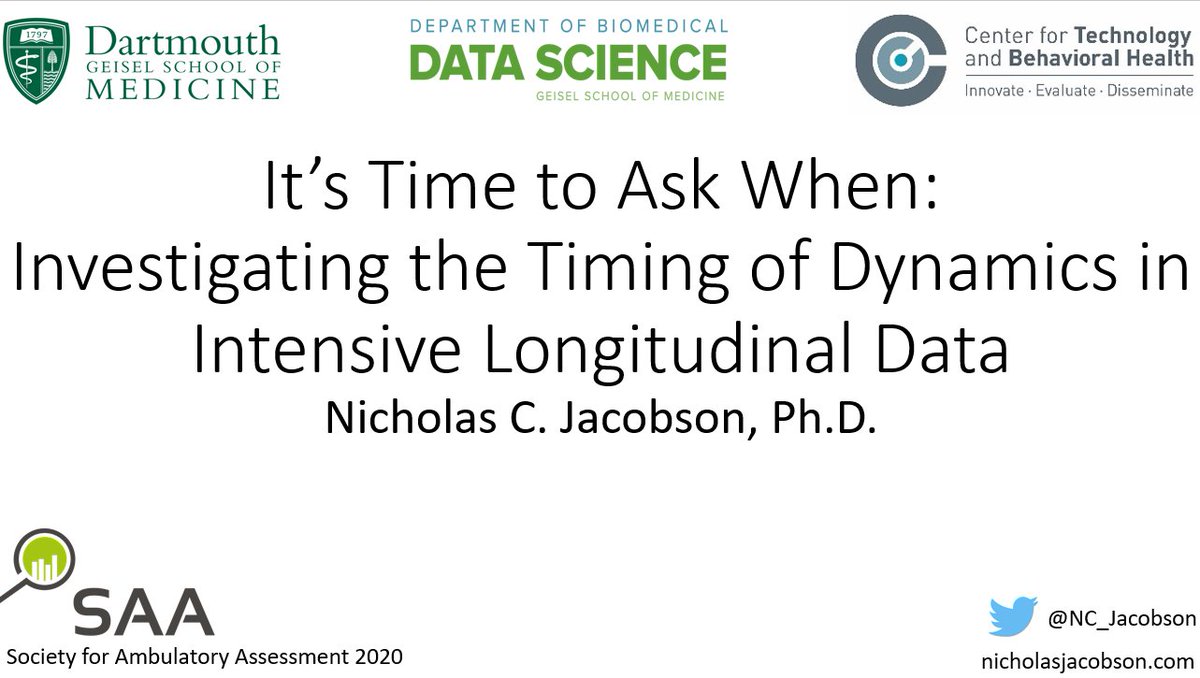
Join me tomorrow at #TIPS2022 for a discussion of Time-Varying Network Dynamics of Major Depressive Disorder
#NetworkScience
Preprint:
psyarxiv.com/pf4kc/
A 🧵for those who can't make it
1/19
#NetworkScience
Preprint:
psyarxiv.com/pf4kc/
A 🧵for those who can't make it
1/19

Preview: as a field we're making a lot of assumptions that probably aren't right and are kind of a big deal.
2/19
2/19
1st assumption:
Specifically:
Changes in MDD are gradual
Symptoms occur "most of the day nearly every day" in major depressive episodes
3/19
Specifically:
Changes in MDD are gradual
Symptoms occur "most of the day nearly every day" in major depressive episodes
3/19
Here's what MDD symptoms can actually look like in persons who meet criteria for MDD.
75% of the variation in symptoms occurs within days rather than across days or weeks.
❌Assumption 1 is wrong
MDD symptoms don't change slowly - they change quickly
4/19
75% of the variation in symptoms occurs within days rather than across days or weeks.
❌Assumption 1 is wrong
MDD symptoms don't change slowly - they change quickly
4/19

2nd Assumption: MDD is a monolithic entity
Only symptom severity matters, the symptoms themselves are interchangeable
5/19
Only symptom severity matters, the symptoms themselves are interchangeable
5/19
Rather than being some top-down latent process,
When you investigate it MDD symptoms they predict one another over time & do so differently for different people
❌Assumption 2 is wrong
MDD symptoms can function as a network, predicting one another, w/ heterogeneity
6/19
When you investigate it MDD symptoms they predict one another over time & do so differently for different people
❌Assumption 2 is wrong
MDD symptoms can function as a network, predicting one another, w/ heterogeneity
6/19

Assumption 3: The MDD network dynamics don't change
The relationships between MDD symptoms are fixed (i.e. anhedonia always has a positive linear relationship to later concentration difficulties for this person)
7/19
The relationships between MDD symptoms are fixed (i.e. anhedonia always has a positive linear relationship to later concentration difficulties for this person)
7/19
So based on prior work, we don't know much about whether MDD symptom dynamics evolve or change across time.
Let's dive in.
8/19
Let's dive in.
8/19
The data from this study were collected as part of an R01, where participants (N = 105 so far) completed measures of their depression sxs 270 times (3x per day for 90 days)
We'll focus on a few participants to dive in detail.
9/19
We'll focus on a few participants to dive in detail.
9/19
We ran person-specific (i.e. N = 1) time-varying vector autoregressive models using generalized additive models.
Each change in PHQ symptom is used to predict the changes in each PHQ symptom at the next measurement occasion, & relationships can change over time
10/19
Each change in PHQ symptom is used to predict the changes in each PHQ symptom at the next measurement occasion, & relationships can change over time
10/19
Let's look at the symptom network of participant 1
The symptom changes pretty dramatically over time - concentration goes from having virtually no influence to the most influential in the network
11/19
The symptom changes pretty dramatically over time - concentration goes from having virtually no influence to the most influential in the network
11/19
Participant 2's network is pretty stable for a while until motor symptoms go from essentially carrying no influence to being the most influential symptom in the network
12/19
12/19
Participant 3 experiences big changes in how much motor issues influence other MDD symptoms.
13/19
13/19
Okay, but what about the whole sample?
86% of participants had their most influential symptom change
ALSO:
*MOST* participants had their most influential symptom change to their least influential symptom at some point in the study.
14/19
86% of participants had their most influential symptom change
ALSO:
*MOST* participants had their most influential symptom change to their least influential symptom at some point in the study.
14/19
So what does this mean for our assumption 3?
It's also wrong ❌
Most people experience dramatic changes in MDD symptom networks across time
15/19
It's also wrong ❌
Most people experience dramatic changes in MDD symptom networks across time
15/19
What are the implications of all of this?
MDD is a person-specific and everchanging symptom
This has big implications towards treatments if we try to target these influential symptoms.
16/19
MDD is a person-specific and everchanging symptom
This has big implications towards treatments if we try to target these influential symptoms.
16/19
Changes in MDD symptom dynamics change so drastically and so rapidly that targeting central MDD symptoms may be like playing a game of Whac-A-Mole.
The only way to win is to be adapt quickly.
17/19
The only way to win is to be adapt quickly.
17/19
Probably the only way to meet these rapid symptom network changes is using digital interventions -- traditional interventions are just too slow.
18/19
18/19
Thanks to our participants, everyone on the team that has led this work, and all who have inspired this work, including @bringmann_laura, @EikoFried, @aaronjfisher, @BorsboomDenny, & @SachaEpskamp.
19/19
19/19
• • •
Missing some Tweet in this thread? You can try to
force a refresh





